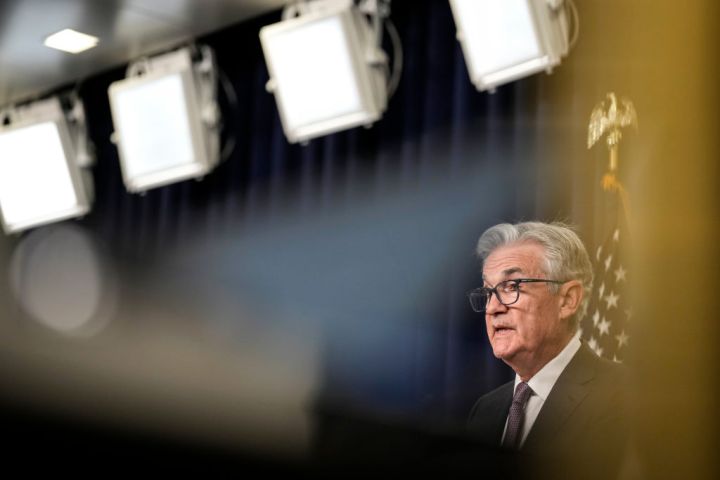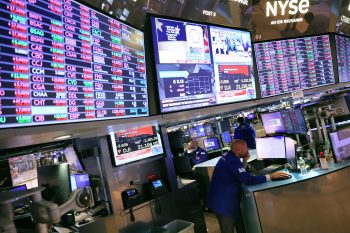
As the Fed cranks up interest rates, critics ring warning bells
As the Fed cranks up interest rates, critics ring warning bells

This year, the Federal Reserve has raised interest rates by 75 basis points, or three-quarters of a percentage point, at three consecutive policy meetings, while leaving room for more hikes to come. Not everyone is happy with the speed of these rate increases, which are meant to chill economic activity in an effort to rein in inflation that has reached a four-decade high.
In Congress, progressives like Sen. Elizabeth Warren of Massachusetts have been especially vocal in their ire. The key issue for many: Will the rapid hikes put the economy in a recession without substantially bringing down prices?
“I think [Fed Chair Jerome] Powell’s interest rate bender has us on the precipice of global recession,” said Lindsay Owens, a former Warren adviser and the executive director of the Groundwork Collaborative, a progressive policy organization. “He is really going hard on rate hikes. And the consequences could be tremendous for so many.”
“Marketplace” host Kai Ryssdal spoke with Owens about what those consequences might be. The following is an edited transcript of their conversation. To listen, use the media player above.
Kai Ryssdal: So, as you look at the Federal Reserve and this moment in macroeconomic policy, what’s your gut? I mean, give me, like, the 30-second “Here’s what I think.”
Lindsay Owens: Wow. I mean, I think Powell’s interest rate bender has us on the precipice of global recession. He is really going hard on rate hikes. And the consequences could be tremendous for so many.
Ryssdal: The chair can speak for himself, but I’ve listened to a whole bunch of what he has to say. And his basic gist is, we gotta get inflation under control. What else can the Fed chair do? As you know, because he says it all the time and I’m sure you listen, he’s got a blunt set of tools, right? Interest rates, that’s it.
Owens: Yeah. I think the unfortunate thing here is that his blunt set of tools, you know, not only are they not sort of very sophisticated, they’re also sort of the wrong tool for the moment. You know, he can just crank on the demand side, and we’ve got this inflation coming from these global supply shocks.
Ryssdal: Just to be clear here so that everybody knows what we’re talking about, when you say “crank on the demand side,” he can raise interest rates to lower demand, right? That’s what you’re saying?
Owens: Absolutely.
Ryssdal: OK. Jay Powell can do a lot of things, he’s a very powerful guy. But he cannot create more semiconductors or couches or speed up the supply chain, right? So what’s your thought on supply side management, as far as it concerns the Fed?
Owens: That’s right. Powell has one set of tools. But he doesn’t have to go it alone. It’s not the case historically that the Fed chair has always gone it alone on prices. You know, Harry Truman, Franklin D. Roosevelt — they confronted inflation without a lot of rate hikes. They confronted inflation with a suite of policy tools, from tax increases to investing in supply. So you know, it’s not required that the Fed goes it alone. And I think Powell can acknowledge that. Powell can go to Congress, he can go to the administration, and he can say, “Look, here are 20 ideas for how you guys can help me bring prices under control so that I don’t have to use, you know, my tool quite so much, which has real consequences.”
Ryssdal: OK. So setting aside for the moment the fact that the Congress in FDR and Truman’s time is not the Congress we have today, because the Congress of the United States cannot agree on what day it is, let alone passing big policy moments. And yes, there was the Inflation Reduction Act, but I would suggest that that’s probably an outlier. But look, do we really want the Fed chair — who’s supposed to be independent so that monetary policy can be separate from the political agenda of one party or another — do we want him or her going to Congress and the White House and saying, “Hey man, you got to do this, this and this because I can’t do it alone?”
Owens: I think we absolutely want a holistic approach to bringing down prices. We know what a one-party approach to bringing down prices looks like. It looks like really going after demand, high levels of job loss. So I think we do want that holistic approach that maybe can bring prices down, you know, overall but doesn’t have all of the negative downside consequences that we expect to see from a solo interest rate strategy.
Ryssdal: You kind of didn’t answer my question, though. Do we want Powell or the Fed writ large engaging in the politics of this economy?
Owens: I think we absolutely want Powell in conversation with the president and Congress. In fact, he already is, right? He goes before Congress twice a year for the Humphrey-Hawkins [Full Employment Act] hearing. I absolutely want my member of Congress weighing in on my behalf, saying, you know, “Cool your jets, Powell. Like, step away from the bar, have a glass of water and think this one through.” Take a look at those JOLTS numbers we saw yesterday — huge drop in job openings. Maybe we can hold off for a minute on the next round of rate hikes.
Ryssdal: So, on that whole, you know, hold off for a minute take a pause thing. I don’t want to get too down into the weeds of macroeconomic policy and monetary policy history here, but [Federal Reserve Chair] Paul Volcker paused in the ’80s and inflation came roaring back. And Powell and other members of the Federal Open Market Committee and other Fed governors and regional bank presidents have been saying, “We can’t pause because we want to make sure inflation is good and dead — not just mostly dead.”
Owens: Yeah, I mean, you’re absolutely right. They’re clearly committed to this approach. But I think it is very reasonable for folks to be concerned about where they’re headed, given the tremendous consequences that we all face, and particularly, you know, those first fired are older workers, workers with disabilities, Black workers. The consequences of overreach here are just tremendous.
Ryssdal: Is it possible that we rely too much on the Fed? That Congress in its desire not to be seen as actually doing anything controversial has sort of outsourced all kinds of policymaking, economic policymaking, to the Fed?
Owens: Oh, gosh, you are really singing from my hymnal on this one. You know, the Fed basically offers one procedure: a lobotomy, right? They, you know, they cure the prices because they take your brain out, right, so you can’t even enjoy it on the other end. But the other problem is we don’t really have those democratic processes that we have, you know, with Congress. So, if I don’t like a bill that Congress is considering, I can call my congressman. I do think the Fed taking such a sizable role in our economic policymaking is really at odds with some of the democratic principles of the country and democratic principles that I think make our economy better for all of us.
Ryssdal: I can’t argue with it, except for one thing, which is word choice, right? Which is, the Fed “taking” that policy role the Fed has been given by statute.
Owens: Sure, absolutely. We should really be thinking about what it means for Congress to have ceded so much of that economic policymaking to the Fed.
There’s a lot happening in the world. Through it all, Marketplace is here for you.
You rely on Marketplace to break down the world’s events and tell you how it affects you in a fact-based, approachable way. We rely on your financial support to keep making that possible.
Your donation today powers the independent journalism that you rely on. For just $5/month, you can help sustain Marketplace so we can keep reporting on the things that matter to you.

















